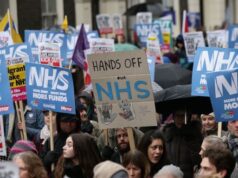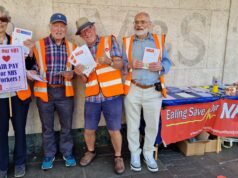Issue: 31
December 2015
This occasional newsletter is researched, written and edited by a group of concerned residents in Ealing, West London who want to preserve our NHS. We view the wholesale engagement of private, for-profit healthcare service suppliers as unnecessary, profligate and dangerous. Process improvement is what is needed in our NHS – not revolution.
IS SHAPING A HEALTHIER FUTURE (SaHF) ON ITS LAST LEGS?
SaHF was/is a June 2012 plan for NHS NW London. Its intentions were/are to include:
+ cost savings of £1 billion by 2015
+ improving care both in hospitals and in the community and saving many lives each year
+ eliminating 5,600 jobs
+ closing 979 beds
+ closing 4 of the 9 hospital A&E units
+ switching outpatient appointments away from acute hospitals to ‘community settings’ – so called Out-Of-Hospital (OOH) care
+ demolishing the major hospitals at Ealing and Charing Cross and building new much smaller ‘Local Hospitals’ on the heritage sites.
Through the miasma of the eight Clinical Commissioning Groups (CCGs) that spend the NHS NW London budget goodness knows to what extent these intentions has been realised. However:
+ NHS London’s loss for 2014/15 was £110.8 million – so it’s really challenging to envision any significant cost savings accrued last year by NHS NW London
+ Clearly only two of the A&Es have closed and demolition has not yet started on the Ealing and Charing Cross sites
+ There is still no clear budget for SaHF. The OOH budget for example has fluctuated widely over three years – from as low as £72 to £86 million over three years to over £190 million each year!
It was made clear in June 2012 that some of the proposed SaHF services were already being put in place. It was also stated that the SaHF changes would ‘take at least three years to put in place’. Three years have now passed but I can find no public statements as to when the SaHF changes will be completed.
Data on NHS NW London job and bed losses is hard to find. No-one, currently, seems to want to talk about how many lives have been/are being saved. As for improving care in hospitals, the consistently poor A&E performance at all but one of the NHS NW London acute hospitals makes this a nonsense. In fact the region has the worst performing Type-1 A&E in England. Ironically the only acute hospital A&E which is consistently performing well in the region is Ealing Hospital’s A&E. This unit, of course perversely, is on the SaHF closure list.
By any reasonable measure SaHF must be viewed as a failure.
It’s unproven, late, over budget and unfunded. Surely it is just a matter of time before everyone notices that the (SaHF) emperor has no clothes.
(Some of the above data has been extracted from John Lister’s excellent June 2012 TUC paper- ‘North West London’s NHS Under The Knife’) – and also from the many research efforts of Save Our Hospitals’ Colin Standfield)
Creating New SaHF Out Of Hospital Services in Ealing : Still in the Slow Lane
The SaHF programme in 2012 promised Out-Of- Hospital (OOH) services which would reduce admissions to hospitals. But OOH services have been a long time coming in Ealing.
At the North West London Joint Health Overview and Scrutiny Committee meeting on 16 October 2015 it was stated that the OOH ‘Hubs’ in North Ealing and East Ealing are expected to be delivered in 2017/2018. They will cost £34 million to set up. As to what services a hub will provide – this is still not crystal clear. A third hub will exist in the new Ealing (‘Local’) Hospital. No date is suggested for this but a £90 million price tag for creating this hospital is quoted.
However all of the above capital spend requires approval up to HM Treasury level. Such approvals are unlikely to be obtained before summer 2016. The relevant Business Cases are apparently still not finalised.
McKinsey &Co Management Consultants Still Riding the SaHF Gravy Train
Colin Standfield of Save Our Hospitals has revealed that McKinsey & Co received £549,828 from SaHF in August 2015. And the nature of the work, apparently, was ‘Delivery Architecture’.
Given that SaHF was conceived by 2012 one might have thought that the architecture to deliver SaHF (whether ‘soft’ or ‘hard’) should certainly have been in place way before 2015.
Since 2013 NHS NW London has paid external advisors over £33 million in fees. McKinsey &Co alone received £27,000 every day last year!
NHS NW London Pays McKinsey & Co £150,000 to ‘Mark Its Own SaHF Homework’
In 2009 McKinsey & Co were employed by NHS London to extol the virtues – with little supporting evidence – of reducing expensive A&E services and replacing them with cheaper ‘Out-Of-Hospital’ services. This ‘efficiency’ mantra was much in evidence in the 2012 NHS NW London SaHF strategy and programme. Part of the SaHF programme was the closure of four of the nine hospital A&E units.
In September 2014, two of these units were closed – at Central Middlesex and Hammersmith Hospitals. Immediately after the closures A&E performance figures for the region plummeted. They fell so far that the region was, and is still often, the poorest performing A&E region in England. Most damning was the region’s being England’s worst for Type-1 A&E patients.
Activists were understandably up in arms. NHS NW London responded by saying (incredibly) that the poor performance had nothing to do with closing two of the nine hospital A&E units. To bolster their position they announced they would commission an independent review of why the poor performance came about and what lessons could be learnt.
This ‘independent’ report never reached the public domain. On 27 October 2015 Save Our Hospitals submitted a FOI request for sight of the report and supporting details. NHS England replied on 26 November 2015. The report said the drop in performance had nothing to do with the closure of the two A&E units. It cited a long list of unconsidered factors the main one of which was unexpected increase in local demand. I call this very poor capacity and contingency planning.
But just as mind boggling was the identity of the ‘independent’ report’s author. No other than McKinsey & Co. NHS NW London paid McKinsey & Co £150,000 to report on the performance of McKinsey & Co’s A&E closures’ strategy and programme. This is truly shocking and clearly corrupt.
Solace Mental Health Drop-in Centre to be Rebuilt with No Loss of Space or Capacity
Some good news at last for 80+ users of the Solace mental health drop-in centre in Bowman’s Close West Ealing. Last year it was threatened with closure. A complicated deal was put together which would have rebuilt the centre as a much smaller facility.
However, in November 2015 however Ealing Council announced a better deal which would rebuild the centre with no reduction of space or capacity. Existing staff will be retained and a larger kitchen built. Three new mental health residential units will also be built. This is going to cost £640,000 and the work will begin in summer 2016. There is still a capital bid to be won in early December but service users are now confident that Solace has been saved.
Jeremy Hunt MP Ducks His Southall Appearance on the Day 27,741 Junior Doctors Voted for Strike Action
Over 100 demonstrators assembled outside Southall Conservative Party HQ on the evening of 19 November 2015 to ‘welcome’ the Secretary of State for Health. The demonstration was organised by the Ealing Save Our NHS group (www.ealingsaveournhs.org.uk). Hunt’s visit to the Tories in Southall had been planned weeks ago. But he never turned up. His non-appearance was rather pathetic.
On the same day Sir Bruce Keogh, England’s top doctor, suggested Junior Doctors might not help on strike days during which there was a terrorist attack in England. What a crass suggestion this was. Understandably Juniors Doctors reacted to it with fury.
And on the day after – 20 November – the Health Secretary failed to turn up in the House of Commons to answer a question on the Junior Doctors’ strike. Maybe Hunt is on the way out.
By the way, a previous time a senior figure cancelled his attendance at a meeting in Ealing was on 19 April 2007. West London Tram (WLT) boss Christopher Dean was the no-show. On 2 August 2007 the WLT was cancelled. Let’s hope history repeats itself in some way and the Health and Social Care Act 2012, Hunt, SaHF, and Junior Doctors’ contract changes are all ‘cancelled’.
Private Care Homes Crisis Looming
Nine out of ten elderly and disabled people who are living in care homes are now in privately owned facilities. Many of these residents’ fees are paid for by Local Authorities. However with Local Authority budgets being squeezed the amounts being paid have gone down in recent years. This has lead to reduction in care home beds and care home closures.
A major alarm bell rang in July 2011 when Southern Cross, the then largest private care home group with 750 homes, went out of business. Now the current private care home leader, Four Seasons with 350 care homes, is having difficulties. In February 2015 it closed seven care homes in Northern Ireland. It is apparently struggling to pay its annual £26 million interest payment on its considerable borrowings.
Four Seasons, Bupa UK, HC-One and Care UK lobbied the Government for £3 billion to head off care home closures. However in November 2015 Chancellor Osborne promised less than £0.5 billion.
Care homes are also now dreading the implementation of the National Living Wage in April 2016 which will increase their operating costs and could well lead to bed and home closures.
Care home closures and bed reductions will directly impact the occupancy of NHS hospital beds. Bed blocking will increase and occupying hospital beds maybe the only available solution to care home closure.
How this all may impact NHS NW London and SaHF is hard to gauge. No doubt NHS London will pay a six figure sum to McKinsey & Co to write a report on how SaHF will handle this and the ‘lessons there are to be learned’……..
NHS WLMHT Whistle-blower Finally Vindicated as ‘Having Acted in Good Faith’
Dr Hayley Dare, a 20 year NHS veteran clinician, had concerns about bullying and harassment of staff at the West London Mental Health Trust (WLMHT). She voiced these concerns to WLMHT’s CEO Steve Shrubb in March 2013. WLMHT spent £130,000 fighting Dr Dare’s claims, even though NHS staff surveys supported her allegations. She was dismissed from her role as consultant clinical psychologist by means of a three line email.
In September 2014, Dr Dare lost her employment tribunal on a technicality. WLMHT pursued her for £100,000 in costs. Dr Dare appealed and on 6 November 2015 WLMHT conceded that she had acted in the public interest and in good faith. She received £10,000 back from the Trust. Both parties will now bear their own costs of the case.
WLMHT’S Chairman Nigel McCorkell resigned in July 2014 and its CEO Steve Shrubb took retirement in November 2015.
GP Conflicts of Interest
The front page lead of ‘The Times’ on 11 November 2015 detailed routine conflicts of interest by GPs who sit on Clinical Commissioning Groups (CCGs). The scale of such conflicts is staggering – estimated at £2.4 billion in over 400 contracts.
I was not the only one to complain when Ealing CCG signed an agreement with Care UK’s Harmoni out of hours GP service. Some of the ECCG Governing Body GP members owned shares in Care UK. However they clearly felt no conflict. As they had declared the share ownership they seemed to feel that there were no corporate governance issues to be considered!
Inadequate Mental Health Spending by Local Authorities
The charity Mind has calculated that just 1% of public health budgets are spent on tackling mental health problems. Mind estimates that in 2015/2016 Local Authorities will spend just £40 million on mental health problems. £93 million will be spent on promoting physical activity; £111 million spent on tackling obesity; £160 million on anti-smoking measures; and £664 million on sexual health.
In fact some Local Authorities do not intend to spend any money at all on mental health services. It’s an accepted fact that one in five adults are suffering from a mental health problem. Those Local Authorities spending nothing on mental health problems ought to be ashamed of themselves.




